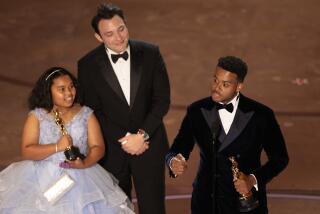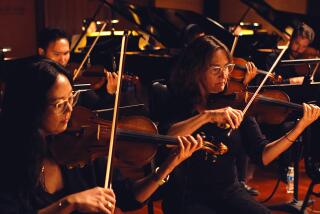Los Angeles Chamber Orchestra celebrates Chaplin’s Little Tramp
The Los Angeles Chamber Orchestra’s silent film Sunday evening at UCLA’s Royce Hall is marking two important anniversaries: the 25th year of the gala that presents classic comedies with live musical accompaniment and the 100th anniversary of Charlie Chaplin’s beloved Little Tramp character.
The group will bookend the Tramp by screening the 1914 Keystone short “Kid Auto Races at Venice,” the debut of the character famous for his bowler hat, baggy pants, tiny mustache, shuffling walk and cane, and his last appearance, in the 1936 classic “Modern Times,” a funny, romantic and perceptive satire on the Machine Age.
Timothy Brock, who has restored Chaplin’s own scores, will be on hand to conduct his restoration of Chaplin’s music — arranged by David Raksin and Edward Powell — for “Modern Times” as well as his new score for “Kid Auto Races at Venice.”
Working closely with the gala was Kate Guyonvarch, director of the Paris-based Roy Export S.A.S., which owns the copyrights and other relevant rights to all the films Chaplin made dating back to when he opened his own studio in 1918, which includes such masterpieces as 1921’s “The Kid,” 1925’s “The Gold Rush,” 1931’s “City Lights” and 1940’s “The Great Dictator.”
“We have a distributor called MK2 that handles normal distribution,” Guyonvarch said. “But we handle all the special events.”
And she relishes keeping the legacy of Chaplin, who died in 1977, alive. “Someone once said I have the best job they ever heard of,” she said by phone from Paris.
When Guyonvarch started with Roy Export in 1982 as a secretary, Chaplin’s works were far less accessible because of “the formidable Rachel Ford, who had been his business manager,” she said. “She said no to everything. She protected him.”
After Ford, Guyonvarch “started going to film festivals and making it known we weren’t as horrible as people thought.”
And now Guyonvarch works for Chaplin’s children — Roy Export is part of Association Chaplin, which was created by some of his children — “therefore a generation who are far less protective and more open to the idea of sharing and having researchers able to read his notes and write books about him. It is just a completely different time.”
This year has been especially busy for Guyonvarch because of the countless Little Tramp centenary celebrations, including a screening complete with orchestra of “City Lights” at the Forssa Silent Film Festival in Finland in August, as well as Brock conducting Sunday evening’s program with the New York Philharmonic in September and in November in Rouen, France.
Noted film historians and preservationists Kevin Brownlow and the late David Gill, said Guyonvarch, originated the concept of screening Chaplin’s silent films with live musical accompaniment in 1989 as a way to celebrate Chaplin’s centenary. “City Lights” screened for a week with much success at the Dominion Theatre in London, where the masterwork had premiered in 1931.
The following year, LACO board member Hanna M. Kennedy pioneered the silent film gala in Los Angeles, and countless orchestras around the world have followed suit. “It is a way of bringing Chaplin films and his music to people. These concerts are such a fantastic event. It’s become bigger and bigger because orchestras realize it’s a good family and fundraising event.”
Ironically, said Guyonvarch, “when you are watching the film, you forget the orchestra is there — you get completely taken in by the film. Suddenly, at the end you realize these [musicians] have been slaving away for an hour and a half, and then the audience explodes because they realize what an extraordinary feat they have done.”
But no orchestra had ever shown “Modern Times” until LACO did in 2000 because, though it was technically a silent film, there are numerous sound effects, some dialogue and Chaplin singing “Titina.”
Guyonvarch had her doubts it would work with an orchestra. But Kennedy, who is co-chair of the gala, “was persistent,” said Guyonvarch.
And Kennedy’s determination paid off.
Chace Audio in Burbank was able to extract the sound effects, dialogue and Chaplin’s performance from the soundtrack and create a new track enabling orchestras to play live accompaniment.
“We decided the best way to have Charlie’s song was to have the orchestra stop playing while Charlie was singing, and that worked very well,” said Guyonvarch.
--------------------
What: “Modern Times” and “Kid Auto Races at Venice”
Where: Royce Hall, UCLA
When: 6:30 p.m. Sunday
Tickets: $40 and $90; $400 for grand patron tickets, which includes a post-film supper.
Information: https://www.laco.org
More to Read
Only good movies
Get the Indie Focus newsletter, Mark Olsen's weekly guide to the world of cinema.
You may occasionally receive promotional content from the Los Angeles Times.







